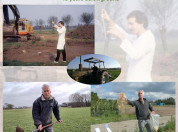Search
26 search results
Search results
-
National Growth Fund finances Dutch Holomicrobiome Institute
The government of the Netherlands has allocated €200 million from the country’s National Growth Fund for a public-private consortium that will conduct research into 'microbiomes' and economically interesting applications thereof. In the consortium, NIOO is partnering with ten Dutch universities, five university-medical centres, four universities of applied sciences, many other knowledge organisations and together with dozens of small and large companies and societal organisations.
-
From Pioneer to Soil Prophet: 40 years belowground - Farewell symposium Wietse de Boer
On Thursday April 4 we'll have the Farewell Symposium and reception for our long-time colleague Prof. Dr Wietse de Boer (Department of Microbial Ecology at NIOO and Wageningen University).
-
Suzanne McGowan appointed Professor of Aquatic Ecosystem Dynamics
Meet the new Special Professor of Aquatic Ecosystem Dynamics: Suzanne McGowan. As of 2024 she is appointed at Utrecht University. Her chair offers a unique combination between the university's faculties of Science and Geosciences. McGowan integrates this with her main affiliation as the Head of Aquatic Ecology at the Netherlands Institute of Ecology (NIOO-KNAW). As a professor, she aims to uncover how water ecosystems have been functioning, and how the major changes on our planet affect this.
-
Restoring and rewilding ecosystems
It is a topical issue and has long been a research interest of NIOO: how do you restore nature? For example, former farmland can be made more suitable for nature again, and areas connected to each other. This approach could also help to mitigate the consequences of climate change. Furthermore, a growing amount of knowledge about rewilding has become available in recent years. It has become clear that, in the long run, rewilding yields strong ecosystems with more biodiversity.
-
Exposition 'Augmented Ecofeminisms: Climate, Water and Women'
This month at NIOO: the art exhibition 'Augmented Ecofeminisms: Climate, Water, and Women'. This exhibition illustrates how the problems associated with climate change differentially affect women in many parts of the world.
-
Postgraduate course: New frontiers in microbial ecology & climate change
In November, a five-day course on microbial ecology & climate change will be organised on Schiermonnikoog. Our colleague Eiko Kuramae from the Department of Microbial Ecology and professor at Utrecht University is one of the organisers. -
Can we train soil microbial communities to promote plant growth?
Microbial communities are vital for ecosystem functions, and utilizing their diversity, particularly in phosphate-solubilising microbial communities, can provide sustainable solutions for agriculture. However, constructing and optimizing these communities present challenges due to complex interactions among microorganisms.
-
Dealing with bluegreen algae
Worldwide, excessive nutrient loads in lakes and reservoirs have led to the rapid increase of harmful cyanobacteria. Blooms of these algae block the use of surface water for drinking, irrigation and recreation. Climate change is expected to further increase the frequency, duration, and magnitude of cyanobacterial blooms. Aquatic ecologists from NIOO are busy gaining more detailed insights into cyanobacterial blooms across scales, in future climates and in respect to toxicity.
-
Greenhouse gases
Climate change is amplified by greenhouse gas emissions. At NIOO, we work on the fundamental understanding of how gases such as methane, carbon dioxide and nitrogen dioxide influence ecosystems. Our knowledge of carbon and nitrogen cycles provides insight into the potential of greenhouse mitigation tools. In a Dutch freshwater lake or the soil of a tropical rain forest.
-
Galápagos (4): the expedition film
An international research team led by the Netherlands Institute of Ecology (NIOO-KNAW), the University of San Francisco de Quito (USFQ) and the Galápagos Science Centre (GSC) is to search for invisible life on the Galápagos Islands. The diversity of bacteria and other microscopic organisms may not be evident to the naked eye, but it is essential to nature. The research team will uncover the yet unknown microbial world that Darwin could not see. Specific focus is given to microorganisms associated with the islands' giant daisies (Scalesia): unique endemic plants that are currently threatened by extinction.
